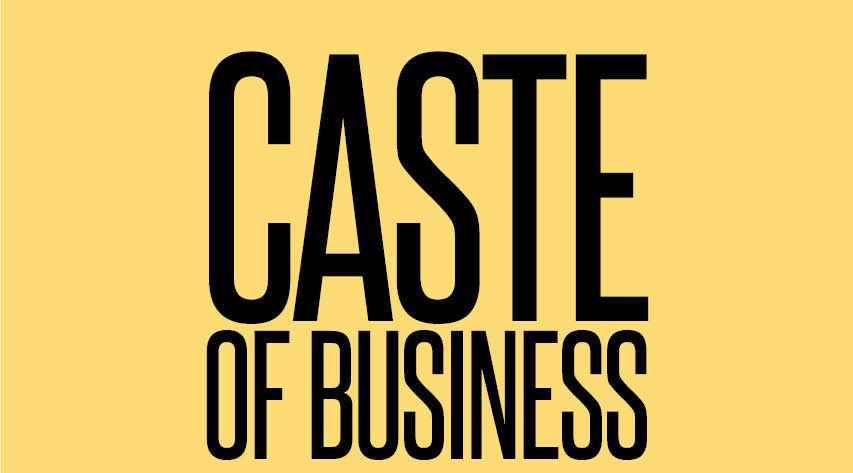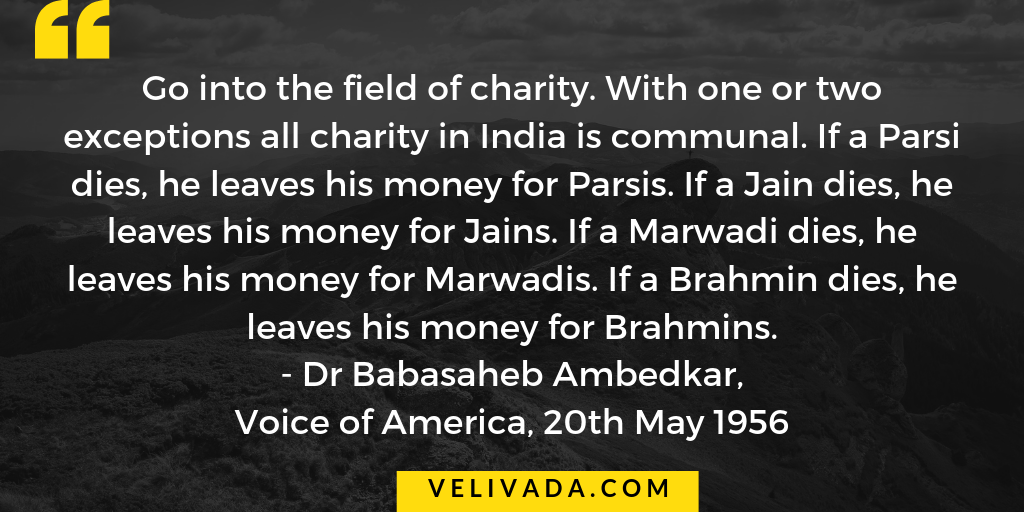
Why Is It Futile To Expect Charity From The Business Class Of India?
“Go into the field of charity. With one or two exceptions all charity in India is communal. If a Parsi dies, he leaves his money for Parsis. If a Jain dies, he leaves his money for Jains. If a Marwadi dies, he leaves his money for Marwadis. If a Brahmin dies, he leaves his money for Brahmins. Thus, there is no room for the downtrodden and the outcastes in politics, in industry, in commerce, and in education.” – Dr Ambedkar, in his article “What are the Prospects of Democracy in India” for Voice of America, May 20, 1956.
Today, nearly 20% of the world’s population is under lockdown. So far, more than 30,000 people have died and more than half a million have been infected. With more than one lakh cases, America has emerged as a new epicentre of the disease. It clearly shows that the United States of America is not only being hit by the coronavirus, but the great American dream as people call it has magnified the havoc created by the virus.
The world is realizing the catastrophic nature of capitalism. As the countries deal with the pandemic, the same patriarchs of the capitalist world order are being asked to share their resources with people who have been crushed under by their exploitative structures. The nature of this demand can be termed as petty-bourgeois socialism in Marx’s words. Nonetheless, this demand has been addressed by many. Many rich in the west have donated for the fight against the pandemic. But their Indian counterparts have yet again have shown their inherent Manuvaadi nature. They have clapped and banged ‘thaalis’ standing at their sky-high balconies. They have mocked the plight of the poor with their pseudoscience. They are happy to donate at temples in the name of ‘God’ but when it comes to serving humanity they hide in rat holes.
The Indian ruling class has announced 21 days of complete lockdown and in all likelihood, it is going to get extended. The lockdown has created a panic amongst the Bahujan masses. Like always the panic has been left unaddressed and unreported. The plight of the Musahar Dalit community of the north is heart-wrenching, but not shocking. They have always lived in this misery. The virus is just another addition to their problems. The lockdown without any robust economic package shows the negligence of the Indian ruling class towards the Bahujan masses. In this humanitarian crisis many have taken to different social media platforms asking Bollywood celebrities, businessmen, politicians, etc. to help India in fighting the pandemic.
Indian capitalism is the rigid Brahmin-Baniya economic order. The concept of charity in the Brahminical social order legitimizes the exploitation of masses. Bahujans under the Brahminical social order are enslaved and dehumanized. Indian capitalist structure refuses to see Bahujans as living bodies. The wealth that Baniyas create through the exploitation of Bahujans helps in strengthening the Brahminical social order. The Brahmins themselves, who create this social order and make the necessary laws to govern, are seen as individuals who ‘depend’ on others. They are pictured as people with alms who depend on the money that they get from other people.
‘Indian business class’ is the same upper-caste lobby that has earned wealth precisely because of their place in the social structure. The Bahujans in Indian caste system are not regarded as oppressed. As Babasaheb Ambedkar points out, the Indian caste system is not merely a division of labor, but it is actually a division of laborers, not based on individual choice but on social dogma. The scriptures that govern them deny Bahujans their individuality, thus denying them their humanness. Thus the question of charity and welfare for the Bahujan masses never arises in the first place. To expect charity from that upper caste lobby is puerile. Simply because charity is voluntary help to needy humans and the Smritis don’t recognize the Bahujans as needy or equal humans.
One might say that the upper caste business class can come forward for the cause of the ‘nation’. Here the question that arises is if India as a nation exists in the first place, and even if it does then does it exist for all? This question is to be answered with another question whether the communal majority of India exists as a nation? The communal majority of India is divided into different castes and sub-castes.
Thus nationalism even in the form of ethno-nationalism, cannot be true for India. Indian patriotism exists only when there is an outside threat to the Brahminical hegemony. The farce of ‘national integration’ among Indians was constructed to fight British imperialism which in certain ways challenged the Brahminical occupation of India. The virus today is no threat to the Brahminical hegemony in India. It has been brought upon by the rich and their position in the Indian socio-economic order has guaranteed them facilities to save themselves from the pandemic.

As Babasaheb Ambedkar says “Not that a Hindu could not be taught the sense of duty to fallen humanity, but the trouble is that no amount of sense of duty can enable him to overcome his duty to preserve his caste.”
Charity is a humanitarian gesture that stems out of the feeling of compassion. Compassion is the feeling of concern for others. But the upper castes are only concerned about the preservation of the Caste structure, which is the most precious to them. The only feeling that exists within the upper castes is of safeguarding their hereditary authority and wealth. There exists no compassion within them for anyone else. To expect that they’ll share their resources with the Bahujan masses is the ignorance of the intra upper-caste solidarity and upper-caste duties that they have towards each other. Thus it is futile and inconsequential to expect real charity instead of mere Gandhian tokenism from the business classes of India.
Author – Ritik Lalan


+ There are no comments
Add yours